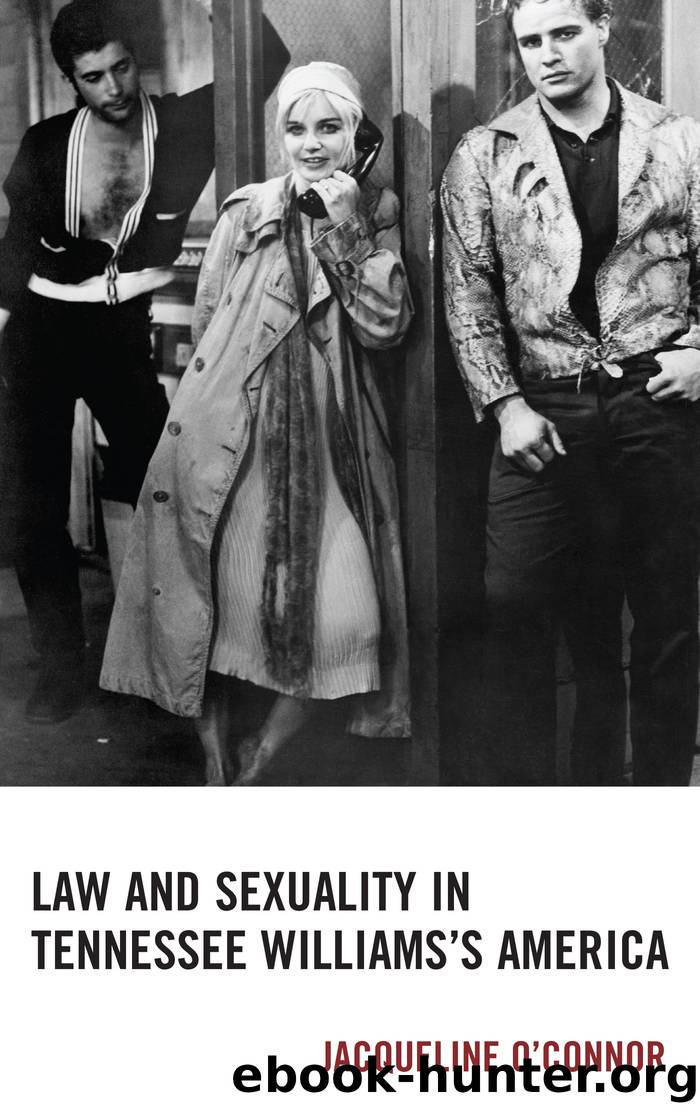Law and Sexuality in Tennessee Williamsâs America by O’Connor Jacqueline;

Author:O’Connor, Jacqueline;
Language: eng
Format: epub
Tags: undefined
Publisher: Fairleigh Dickinson University Press
Published: 2012-08-15T00:00:00+00:00
What seems disingenuous in this questioning is the idea that he did not consider how and why his audiences might find the subject âfilthy,â for, based on the fears he expressed about his fiction of the same period, he knew very well what types of sexual desire and activity are branded as not only dirty but âdegenerate.â And the earliest versions of Battle contain examples of the playâs use of the language of disgust; indeed, his persistent acknowledgment of the âconflicting desires of the flesh and the spiritâ that struck many as âfilthyâ seems to have compelled him to use the language of condemnation as part of the complex self-commentary that contributes to the tension throughout his work. While what he sees as the âpurityâ of the creative form directs his attention, or so he claims, away from the messiness, his readers, viewers, and reviewers are left to grapple with the conflicts: between innocence and evil, between flesh and spirit, between moral and filthy.
Evidence exists, too, that Williamsâs portrait of himself as naïve or otherwise unaware that the struggles he dramatized in Battle would be âunfit for articulationâ is not accurate: he wrote to agent Molly Day Thatcher in November of 1939, one year prior to the premiere in Boston, that creating a new draft of the play meant that he needed to âwrite everything over to tone it down, to eliminate the lunatic note,â and, because of the âviolent, melodramatic nature of the material,â to do a âgreat deal of smoothing out and toning down.â[67] Rather than assume that he is being deceptive in denying his awareness of how the playâs subject might offend, however, it is possible to see the choice of self-assessment he offers in the above passage between innocence and evil as telling and true in another way. For in its opposition of extremes, his determination to revise reflects the duality that defined and drove him: the tension between what he called the puritan and the cavalier sides of his nature. It also calls to mind his summation of the play as a âsynthesis of two parts of my life already passed through:â his innocent adolescence as it comes up against the âturbulent stuff of later experience.â[68] A Christian upbringing in the South solidified the influence of one dominant cultural force with which he would need to reckon, in himself and in others: the emphasis on morality as a guiding principle. How to construct that morality is another issue, however, and the evidence we see Williams putting forth in his creative work is of a morality that incorporates a liberal dose of compassion, the latter a quality widely associated with Christ but not always with âChristian.â The idea of writing as a purifying experience is related to the notion of confession, for in reporting sin the supplicant may be forgiven. Thus it is, perhaps, that he claims the purity in the very experience of writing the play.
The cavalier part of his nature insured that the sins
Download
This site does not store any files on its server. We only index and link to content provided by other sites. Please contact the content providers to delete copyright contents if any and email us, we'll remove relevant links or contents immediately.
| ASVAB | GED |
| GRE | NCLEX |
| PRAXIS | SAT |
| See more | Flash Cards |
| Study Guides | Study Skills |
| Workbooks |
Talking to Strangers by Malcolm Gladwell(12867)
The Compound Effect by Darren Hardy(8508)
Tools of Titans by Timothy Ferriss(7810)
Wonder by R. J. Palacio(7736)
The Lover by Duras Marguerite(7585)
A Court of Wings and Ruin by Sarah J. Maas(7251)
The Circle by Dave Eggers(6830)
Kaplan MCAT General Chemistry Review by Kaplan(6595)
Deep Work by Cal Newport(6562)
To All the Boys I've Loved Before by Jenny Han(5597)
Wiseguy by Nicholas Pileggi(5315)
The Body: A Guide for Occupants by Bill Bryson(4580)
1,001 ASVAB Practice Questions For Dummies by Powers Rod(4347)
Eat That Frog! by Brian Tracy(4147)
Cracking the GRE Premium Edition with 6 Practice Tests, 2015 (Graduate School Test Preparation) by Princeton Review(4041)
Pre-Suasion: A Revolutionary Way to Influence and Persuade by Robert Cialdini(3975)
Barron's AP Biology by Goldberg M.S. Deborah T(3943)
ACT Math For Dummies by Zegarelli Mark(3850)
Kaplan MCAT Organic Chemistry Review: Created for MCAT 2015 (Kaplan Test Prep) by Kaplan(3799)
